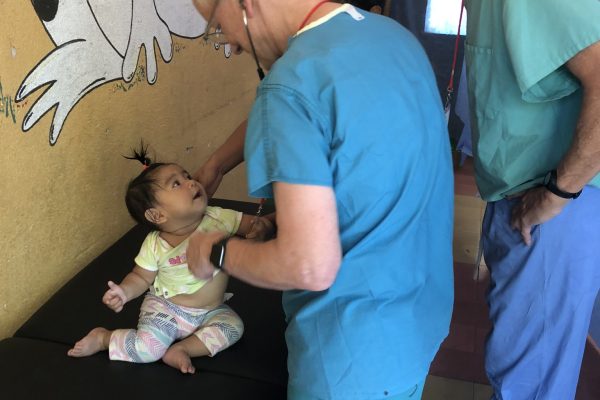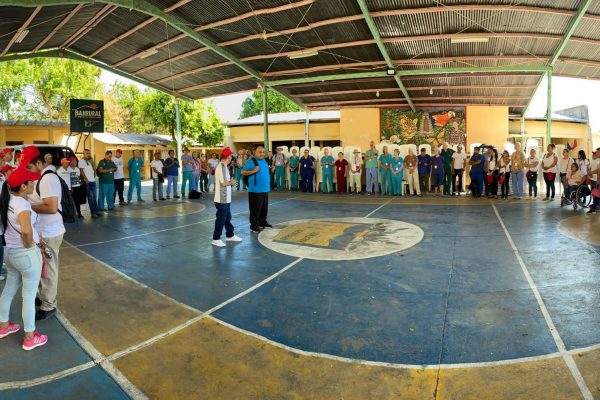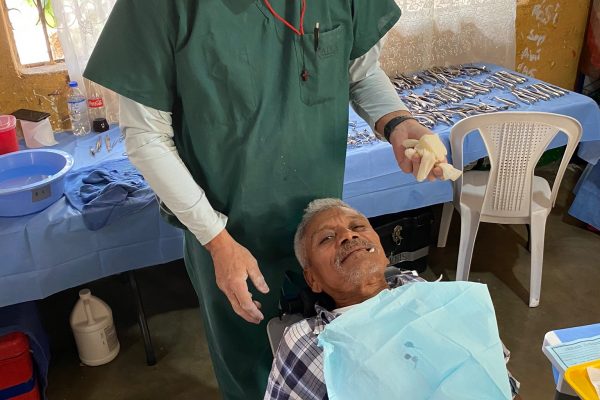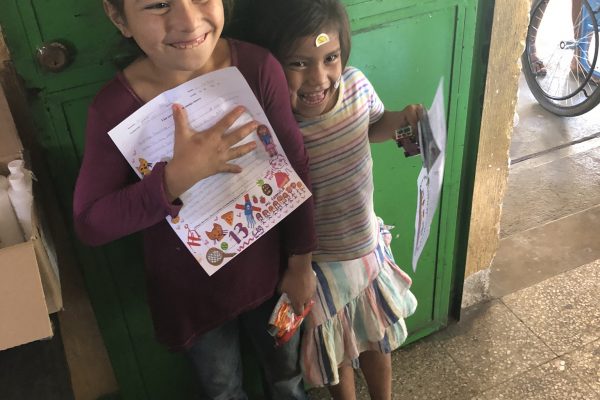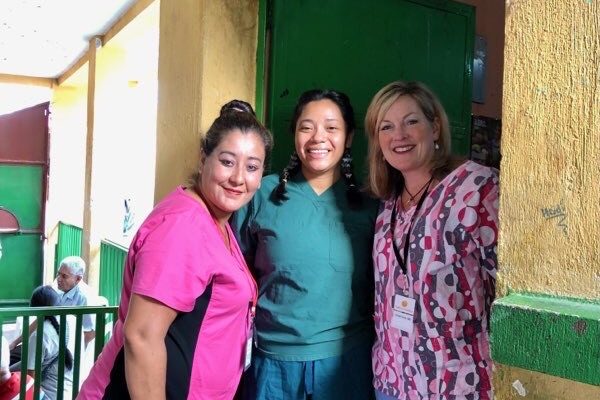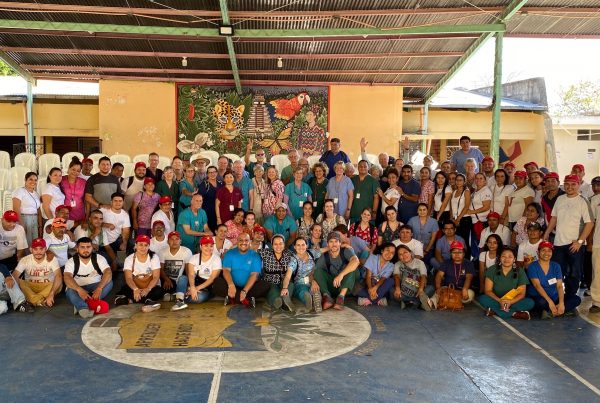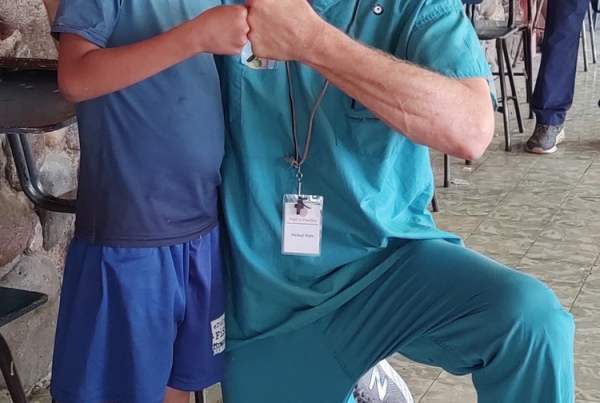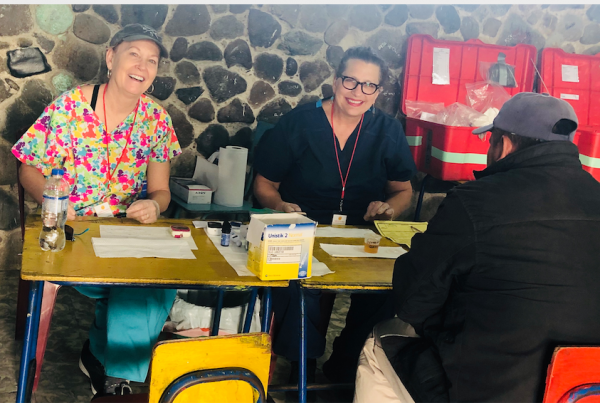Day 3 in Review:
- 511 patients seen in clinic
- 178 in general medicine
- 108 in pediatrics
- 51 in gynecology
- 66 in dental with 119 tooth extractions
- 42 in VIA/Cryo with 2 cryotherapies
- 26 wheelchairs provided
- 32 ultrasounds
- 161 lab tests
Today was our final day serving the wonderful people of Guatemala, and we woke up with anticipation ready to start the day and connect with more people. This morning’s devotion was led by Carriedelle and Sharon. They brought up two first-time volunteers to tell stories from the past few days in clinic. Jimmy and Monica were wonderful and shared stories of how the people of Guatemala have had an impact on them, as well as the Faith In Practice team. Carriedelle and Sharon reminded us that these stories are what keep us coming back. The connections with these loving people draw everyone back year after year. We closed with a beautiful hymn before heading to clinic for the day.
Dental
Access to dental care in the small villages of Guatemala is difficult and we are so grateful to have our dentists, Drs. Greg Lisk and Hugo Lima, with us this year! They have been caring for patients of all ages throughout the week. The dentists commonly see children with bottle mouth caries, a result of going to sleep with a bottle of formula, juice or other sugary drinks. Dr. Hugo Lima worked alongside Greg this week in our dental clinic. He has been a dentist in Guatemala for over 20 years! When asked, he says he loves serving those in his community and says it is his duty to help take care of patients who cannot afford care. Throughout the week, Greg and Hugo’s clinic was certainly the loudest– full of screaming children (and maybe some adults) either prior to or immediately following dental extractions. They pulled hundreds of teeth, endured an intentional bite or two, and infinitely improved the lives of many of their patients. Thank you guys for your hard work!
Pharmacy
We have made it to our final day of clinic and realize that we never wrote about what we do ourselves! Our pharmacy has been a very happening place over the course of the week. We typically fill at least one prescription for the majority of patients that are seen in the clinic. Team leader Bethany Delk has been running the show in the pharmacy for the past 15 years and in the more recent years, she has brought pharmacy residents with her from UVA to help dispense medications, counsel patients, and help our medical providers navigate prescribing from our limited formulary. We passed out hundreds of prescriptions medications, vitamins, lotion and reading glasses with the help of our bus drivers, who also serve as translators for the pharmacy during the daytime. Pharmacies in Guatemala dispense many more medications without a prescription compared to those in the United States so it was interesting to see patients in clinic who already had started a course of antibiotics, but not always the best antibiotic for their chief complaint. We also had several conversations throughout the week with our medical providers about the common disease states that they all were seeing in clinic. Many of our patients presented with chronic pain, which they describe in many different ways, and many of them were already taking nonsteroidal antiinflammatory medications. This made for an interesting prescribing dilemma and an opportunity to counsel on chronic pain management. Our providers did an excellent job being judicious with our formulary medications and we were able to keep stock of almost all medications for the week.
Pediatrics
Alejandro is a 4-year-old boy seen in pediatric clinic today by Mark and his translator Lou. Alejandro was with his father, who was visibly worried. His father showed us a rash on the young boy’s neck and back that he reported had been there since Jose was 2 months old. His father explained he was worried because when they went to a doctor at a small hospital in Guatemala, they were told that the young boy needed a procedure to remove the rash before he was 5 or it would spread all over his body. The father reports they were unable to go to the larger hospital to have it treated because they were told it would be 3,000Q for the boy to be healed of this “terrible rash.” This was shocking to us because all the young boy had was contact dermatitis, a common type of rash, that is easily treated. We provided him with a topical steroid cream that will likely clear the rash completely over the next few weeks. We were also able to relieve a concerned father’s worries and let him know that his young boy was going to be okay!
VIA/Cryo
According to the HPV Cancer Centre, 1,503 women are diagnosed with cervical cancer in Guatemala each year, which is fatal in about 50% of cases. Despite being a preventable disease, cervical cancer is one of the leading causes of death in women in Guatemala. For the indigent patients cared for in our clinics, there is limited access to preventive care and screening. We are so lucky to have Ana and Flores run our VIA/Cryo clinic each year, offering screening for at-risk women. Visual inspection with acetic acid (VIA) is a method of screening for cervical cancer by painting the cervix with acetic acid to identify precancerous lesions with the naked eye. If abnormal cells are identified, they are frozen and destroyed using cryotherapy. This is a low-cost but lifesaving intervention for so many women in Guatemala.
Gynecology
Dr. Christi Hunt, her translator Monica and Dr. Aileen Turner also provided women’s care in our gynecology clinic throughout the week. During Thursday’s devotional, Monica shared a touching story about a patient seen by Christi earlier in the week. To provide a bit of history, Monica is from Antigua and is currently working towards a master’s degree in social work. This is her first trip with Faith In Practice. Many years ago, she worked with her mother to care for patients with HIV. As you can imagine, there is very little access to routine care and antiretroviral therapy for patients with HIV in Guatemala. On Tuesday, a patient came to the gynecology clinic and was seen by Christi and Monica. In discussing her medical history, Christi and Monica discovered that the patient has untreated HIV. Monica suddenly recognized the patient as one that she cared for many years ago with her mother. She was previously referred for a rectovaginal fistula repair, but was unable to have the surgery due to many other health issues. Monica and the patient shared hugs and tears as they reunited under different circumstances. Fortunately, Monica and Christi were able to connect the patient back to care and provide another referral for this procedure she so desperately needs.
Mobility Clinic
The Mobility Clinic, formerly known as Wheelchair Clinic, finished the week with a total of 87 wheelchairs built! There were many other patients seen who had improvements made to their current mobility devices thanks to the work of our mobility team. Gayle has been serving as a physical therapist with Faith in Practice since 2014 and was very much involved in the conversation about mobility and access to mobility when John Tysse and Christopher Delk brought up the matter several years ago. She is a fantastic storyteller and provides great perspective in highlighting how far we have come in providing services to the people of Guatemala. When she started, there were very few supplies that could be distributed for mobility and most were distributed from the pharmacy. Faith In Practice in-country volunteers, Gayle, and many other members of Faith In Practice have worked to refine the services that our village teams are able to provide. This year, we have 20 wheelchair teams for 2020! Our wheelchairs are built by a wheelchair team (Mark, Joel, and Jim with Blanca as the lead) onsite. Blanca, an in-country Faith In Practice volunteer who uses a wheelchair for her own mobility, was an excellent resource for our team! All of our wheelchair volunteers continued to sing her praises throughout the week and they all learned a ton from her expertise! In just spending several minutes with the team on day 1, I learned how important it is to not over inflate the wheels of a wheelchair. Over inflation causes difficulty utilizing the breaks, which makes stopping a challenge. Learning the “why” behind what we do not only reinforced learning and proper technique, but also brought a profound sense of awareness to why each of these steps matters in the process. Today, patients are able to be evaluated in Mobility Clinic and properly assessed to determine what type of assist device would be best suitable. We are grateful for all of the work that has been put into making the Mobility Clinic what it is today.
Day 4 Wrap-Up
This afternoon as clinics began packing away supplies to be shared with the next site, the pharmacy was swarmed with young children. We had a plethora of stickers, notebooks, kazoos, and “dame cincos” to share with them. As we were packing up, I spent time reading a letter written by Claire’s classmate in Asheville to two Guatemala sisters named Elizabeth and Sofia. The letters were handwritten and addressed to Guatemalan children in an effort to create a “pen pal” relationship.
While reflecting about our experiences from our first Faith In Practice trip on the bus ride back to the hotel, a commonly shared favorite theme are the smiling faces seen on our pediatric patients. We will continue to cherish the relationships developed with Guatemalan children for years to come and will certainly print out the many photos taken with them throughout this trip!


